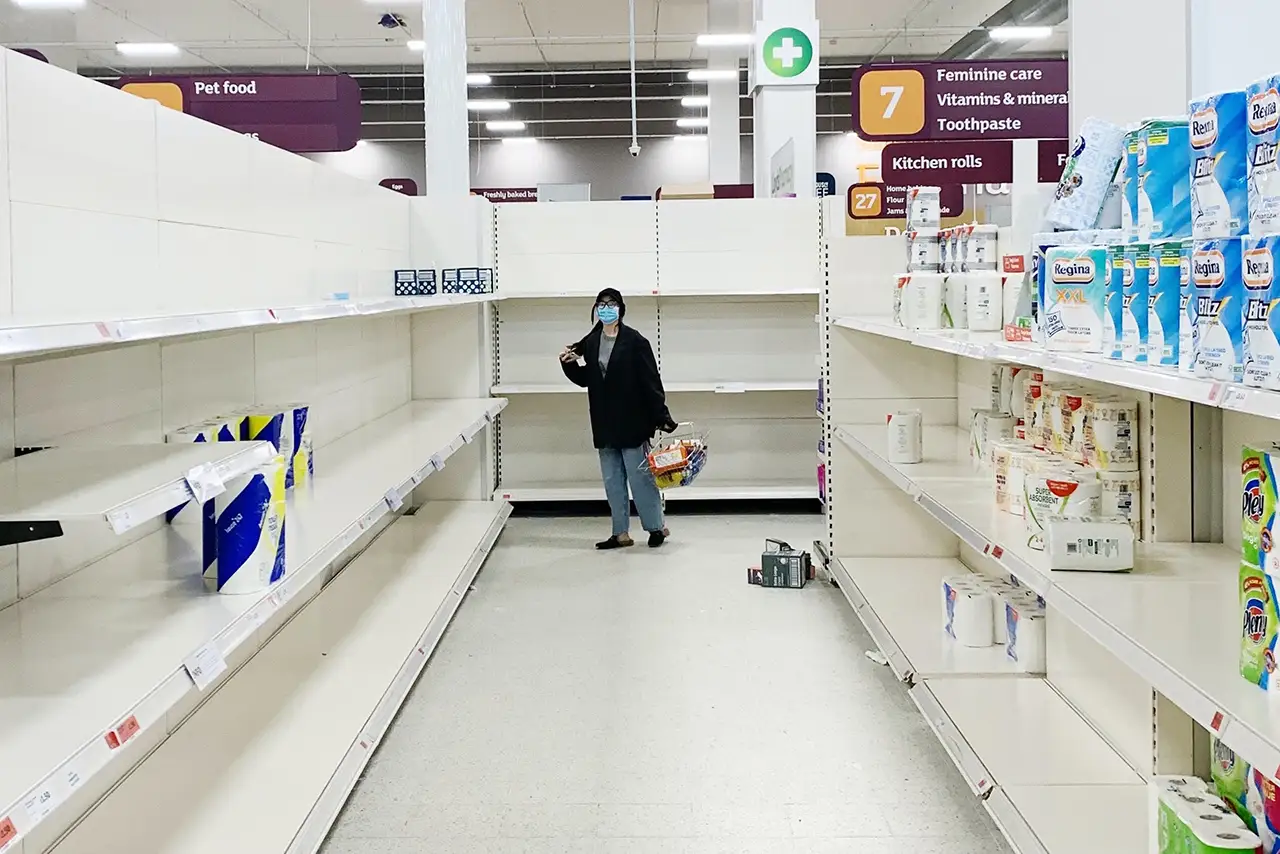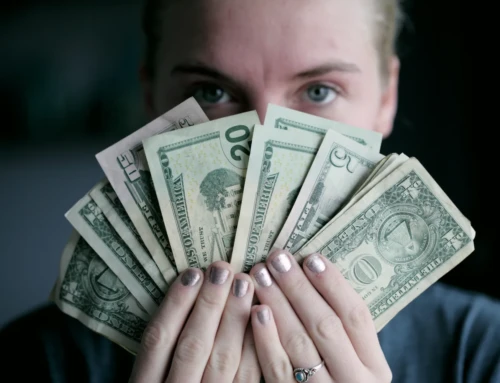What Should We Do?

We’re seeing the question of “What should we do?” pop up in relation to all manner of issues, from the run on toilet paper and hand sanitizer, to business contraction from the shut down on public spaces, and of course, the decline in markets. In this post, we’ll offer some concrete ideas on what we should do, and what we shouldn’t do, considering what’s happening around us.
What to Do
First, what should you do about the empty shelves at the supermarket? The “TP Crisis,” or the TPC, as we may come to memorialize it, is so perfectly American. Next week we’ll learn The Simpsons predicted this.
Take a minute to breathe and consider what this means. People hoarding any consumer product is indicative of a knee-jerk, scarcity reaction with no rational basis whatsoever. Even if the paper companies—which were desperate to make and sell us more paper products well before COVID-19—had no more capacity to make more (which is not the case), we could adapt and use water to clean ourselves. People all over the world have been doing this for centuries, and if the western world must adopt this method, we will. And life will continue, and we’ll be ok. We can and will live, with or without these consumer products. So, please, for your own good, try to stop freaking out about this because there is no fundamental basis for it, or benefit to be had by it.
What should you do if your business is contracting? If this is happening for any reason related to COVID-19, it’s worth remembering that every other pandemic, if that’s what this truly is, eventually ends and life resumes—as will your business, assuming it is otherwise sound. If your business was new, or not, and you don’t have any cash set aside in reserve to smooth out down cycles in cash flow, this will either be a valuable learning experience and a reminder of why cash reserves are such a critical element of any sustainable growth oriented business, or it will be the impetus for you to start another business, or go find a job. At this point, there are still plenty (of jobs), though that could change. So, maybe it’s time to have an honest conversation with your partners, or yourself, and think ahead. Business planning and cash reserve strategies are the lifeblood of closely held business. Business credit is critically important, but still secondary to the first two, or it should be anyway.
What Not to Do
What should you do if your investments are plummeting in value? Most advisors will tell you what you should not do. Don’t panic. Don’t sell. There is a theoretical basis for this template-scripted advice, but anxiety is a biological reaction to seeing your assets decline in value. Money is not math, and math is not money. Money is emotional. And the part of our brains that interprets the information we get telling us the value is down is the same part of our brains that houses the fight or flight mechanism: the amygdala. So, saying don’t panic is like saying don’t breathe.
That said, we can and should take steps to mitigate the feeling of panic. Start by asking yourself, what is the true source of these feelings? Am I worried because I’m near “retirement age”, and haven’t saved enough? In all likelihood, many of us probably could, and will, work a little longer. Am I worried because I might fall behind the financial status of my friends and neighbors? They are likely struggling just as you are, or worse. And if this is truly our biggest problem, we should consider ourselves lucky. When we’ve honestly examined why we feel panicked, we can begin to address the root cause and bring the anxiety level down.
Saying “don’t sell” is also of little value. I’m not suggesting this is necessarily bad advice. For some, it’s very good advice; for others, it’s terrible. The problem is 99% of financial advisors don’t get paid if you sell, so this is the advice we are trained to give EVERYONE, and in all conditions.
What to Consider as an Investor
The first parameter to consider when making investment decisions is when you may want or need the money you’ve invested back to pay your mortgage/rent/grocery bill. Unfortunately, many of us have been drawn too far into risk assets with too much of our money during the run up in prices. But if we maintain healthy cash reserves outside the investments we’ve bought, in theory, we should be able to hold the investments “forever”. Not literally forever, but with that mindset going in, we are more mentally and emotionally prepared to detach from swings to the downside in value.
If you’re a younger investor, theoretically, you should be able to leave the investments you buy alone for twenty or thirty years, which should be more than enough time for this market crash to fully cycle and go back up again before you need to sell your shares. But if, and this is for all of us, we don’t keep as much or more than we’re investing in separate cash reserves, when it goes down sharply, even though rationally speaking, we don’t need to sell, odds still increase that our amygdala will tell us it’s time to sell and protect what’s left. Which is why/how most individual investors shoot themselves in the foot over and over again.
If you’re an older investor, you may not be able to avoid selling, or it may still be advisable for you to do so. As dramatic as this downturn has been, theoretically speaking, it could get a lot worse before it begins to get sustainably better again; periodically, we need to relearn some lessons. Prices are lower, but they are nowhere near as low as they’ve ever been, and they were recently as high as they’ve ever been. So, suggesting they (stock valuations) could not go as low as they’ve ever been again may prove unwise. I hope they don’t. But they could.
Where to Go from Here
The cause of what’s happening in financial markets is not COVID-19. COVID-19 was—is—just the last straw that we’ve all been looking and waiting for.
The root cause of what’s happening in markets is overspending and the proliferation of debt that facilitated it. It’s the same debt problem we’ve had for decades. And the institutions are trying to use the same tool they’ve used every other time it has come home to roost: more debt. In 2008, The Treasury and the Fed were able to reflate the debt bubble and prolong the party. But in doing so, they exponentially increased the load, and may well have overplayed their hand. If the Fed has lost credibility, and the signs pointing to that are ever increasing, we’re left with fiscal stimulus alone to reflate the bubble. Maybe Congress will be able to restore confidence in markets. But even if they can, and we have sincere doubts, we can only spend more than we make for so long before the debt must be settled by default, austerity, or both.
So, what should you do? Begin making the lifestyle adjustments we’ve all known we need to make as a society for a long time—on our own terms, if we still can. Start by developing a cash flow management system. Whether it’s the back of an envelope, or with a software application, this step, by itself, is the foundation for every financial plan. One last time: cash flow management and cash reserve strategies are critical. It is impossible to overstate this. For business and personal financial stability, and growth. We know, these are not the words we want to hear. But they are the words we need to hear.
There may be many other opportunities, big or small, for you to improve your financial position, but these simple, and fundamental, steps are naturally very effective at rectifying the actual problems and easing the mental angst they provoke. At Quantum Leap Capital, we help people with these areas on an ongoing basis, but whether you work with us or not, we hope this post helps you in one way or another. We intend to restart our webinar series soon, and when we can hold stress-free public gatherings again, we’ll be posting about workshops to attend in person.
Until next time, hang in there. Brighter days are coming.
Written
March 16, 2020
Read Time
7 min read
More Posts




